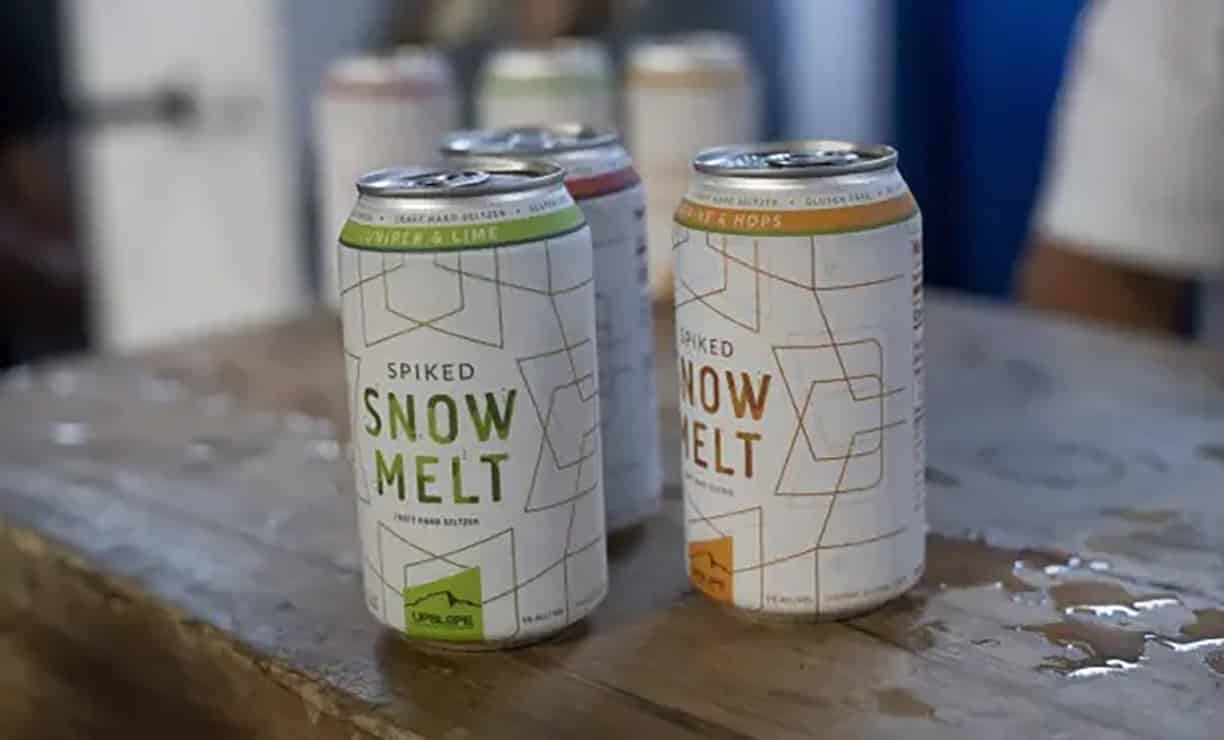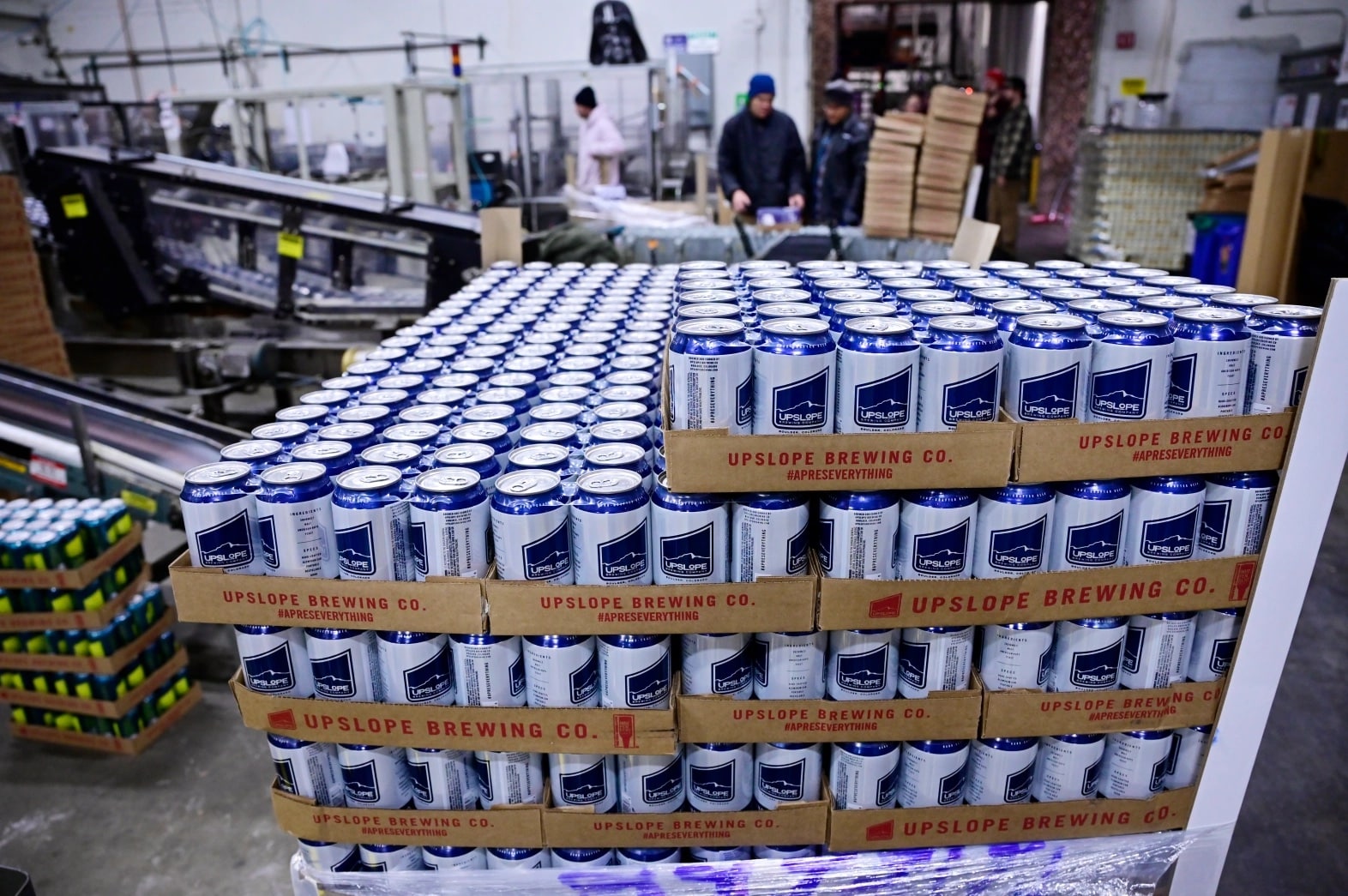
Upslope Brewing’s Spiked Snowmelt hard seltzer is on display during Fizz Fight, a hard seltzer festival at the EXDO event center in Denver. (Rachel Woolf/Special to The Denver Post)
Boulder’s Upslope Brewing has been sued by a Denver man and an Illinois woman who claim that marketing for its Spiked Snowmelt hard seltzers tricked them and other customers into believing the alcoholic drink has nutritional value when it’s actually harmful to their health.
Attorneys for Spencer Heintz and Megan Taylor claimed in a federal lawsuit July 1 that Upslope “fortified” its seltzers “with an insignificant amount of electrolytes, including nutrients such as calcium, magnesium, and potassium, and then promoted on its labels and advertising that the beverage is ‘ELECTROLYTES SERIES +,’ and ‘ELECTROLYTE INFUSED.’”
The lawsuit alleges that such marketing, targeted to outdoorsy and health-conscious drinkers, is “misleading,” “dangerous” and a violation of Food and Drug Administration regulations. It claims that “consumers do not receive the benefit of electrolytes when consuming” the seltzers, because alcohol dehydrates the body. Therefore, the lawsuit alleges, the marketing is deceptive.
Upslope did not respond to several emails and voicemail messages requesting comment.
The seltzers, which debuted in 2019, contain 5 percent alcohol by volume. The Electrolyte Series comes in several flavors, such as passionfruit and mango or peach lemonade.
Heintz purchased a Spiked Snowmelt variety pack at a City Market in Dillon in March, believing it would hydrate him, according to the lawsuit. He would not have bought it if he had known the dehydrating effects of the alcohol outweighed the hydrating electrolytes, his lawsuit states.
Heintz’s attorneys did not respond to requests for an interview with the Denverite or for basic biographical information about their client, such as his age and profession.
Taylor and Heintz are represented by several attorneys with the national law firm Gutride Safier, which is based in California but has an office in Boulder. So far this year, that firm has sued a protein bar company, a bread maker, a baby food manufacturer and a waffle company for alleged deceptive labeling, according to its website. All of those cases are ongoing.
Last year, Molson Coors was sued in California by a customer who claimed the company deceptively labeled its Vizzy Hard Seltzer. That lawsuit, also filed by Gutride Safier attorneys, used some of the same language as the Upslope lawsuit. It claimed that by adding Vitamin C to seltzers, Molson Coors falsely implied the Vizzys are healthy. That case is also ongoing.
“As alcohol beverage producers continue to innovate with new products and labels to meet consumer demand, litigation has moved into the alcohol space and plaintiffs increasingly are bringing litigation challenging these products,” said Alan Pryor, an Atlanta attorney who specializes in food and beverage litigation and is not involved in the Upslope or Vizzy cases.
“Food and beverage plaintiffs’ attorneys are well known for tracking recent litigation trends and occasionally they repurpose allegations from recent lawsuits to challenge new products and labels,” Pryor added. “The Spiked Snowmelt lawsuit is a good example of this practice.”
In the Upslope case, the plaintiffs are asking a federal judge in Denver to force the brewery to modify its marketing and to award an undisclosed amount of money to Heintz and Taylor.

Upslope Brewing’s Spiked Snowmelt hard seltzer is on display during Fizz Fight, a hard seltzer festival at the EXDO event center in Denver. (Rachel Woolf/Special to The Denver Post)
Boulder’s Upslope Brewing has been sued by a Denver man and an Illinois woman who claim that marketing for its Spiked Snowmelt hard seltzers tricked them and other customers into believing the alcoholic drink has nutritional value when it’s actually harmful to their health.
Attorneys for Spencer Heintz and Megan Taylor claimed in a federal lawsuit July 1 that Upslope “fortified” its seltzers “with an insignificant amount of electrolytes, including nutrients such as calcium, magnesium, and potassium, and then promoted on its labels and advertising that the beverage is ‘ELECTROLYTES SERIES +,’ and ‘ELECTROLYTE INFUSED.’”
The lawsuit alleges that such marketing, targeted to outdoorsy and health-conscious drinkers, is “misleading,” “dangerous” and a violation of Food and Drug Administration regulations. It claims that “consumers do not receive the benefit of electrolytes when consuming” the seltzers, because alcohol dehydrates the body. Therefore, the lawsuit alleges, the marketing is deceptive.
Upslope did not respond to several emails and voicemail messages requesting comment.
The seltzers, which debuted in 2019, contain 5 percent alcohol by volume. The Electrolyte Series comes in several flavors, such as passionfruit and mango or peach lemonade.
Heintz purchased a Spiked Snowmelt variety pack at a City Market in Dillon in March, believing it would hydrate him, according to the lawsuit. He would not have bought it if he had known the dehydrating effects of the alcohol outweighed the hydrating electrolytes, his lawsuit states.
Heintz’s attorneys did not respond to requests for an interview with the Denverite or for basic biographical information about their client, such as his age and profession.
Taylor and Heintz are represented by several attorneys with the national law firm Gutride Safier, which is based in California but has an office in Boulder. So far this year, that firm has sued a protein bar company, a bread maker, a baby food manufacturer and a waffle company for alleged deceptive labeling, according to its website. All of those cases are ongoing.
Last year, Molson Coors was sued in California by a customer who claimed the company deceptively labeled its Vizzy Hard Seltzer. That lawsuit, also filed by Gutride Safier attorneys, used some of the same language as the Upslope lawsuit. It claimed that by adding Vitamin C to seltzers, Molson Coors falsely implied the Vizzys are healthy. That case is also ongoing.
“As alcohol beverage producers continue to innovate with new products and labels to meet consumer demand, litigation has moved into the alcohol space and plaintiffs increasingly are bringing litigation challenging these products,” said Alan Pryor, an Atlanta attorney who specializes in food and beverage litigation and is not involved in the Upslope or Vizzy cases.
“Food and beverage plaintiffs’ attorneys are well known for tracking recent litigation trends and occasionally they repurpose allegations from recent lawsuits to challenge new products and labels,” Pryor added. “The Spiked Snowmelt lawsuit is a good example of this practice.”
In the Upslope case, the plaintiffs are asking a federal judge in Denver to force the brewery to modify its marketing and to award an undisclosed amount of money to Heintz and Taylor.

